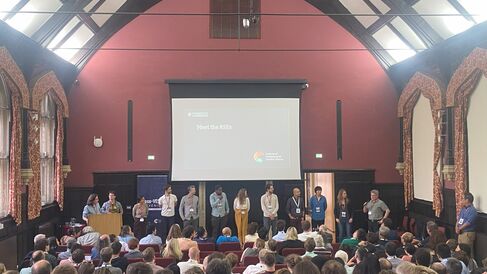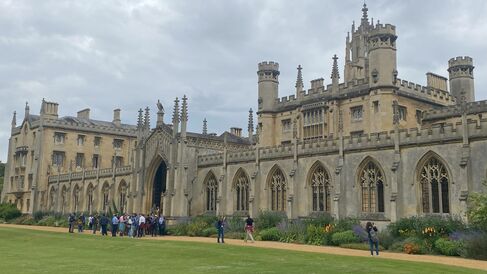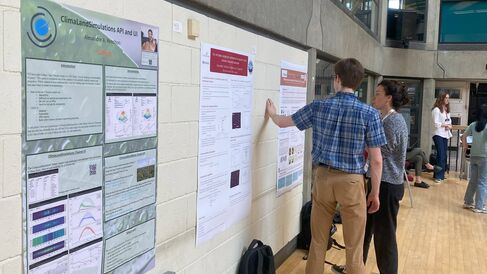
Last week the Institute of Computing for Climate Science hosted the Cross-VESRI convening in conjunction with Schmidt Sciences, the funder of the Virtual Earth System Research Institute (VESRI) and the ICCS.
Read about our collaborators and the VESRI project teams and find out more about Schmidt Sciences.
The event consisted of 4 days of science sessions, meetings, speeches, a poster session and social events to inspire collaboration and connections. Cross-VESRI brought together scientists and researchers from all over the world from the different VESRI projects, many of which had worked together virtually but never had the chance to meet face to face, and others of which were completely unfamiliar with each other's work.
With over 180 scientists in attendance, there was no shortage of optimistic discussion of cross project collaboration and future partnerships.
The event began on Sunday with a reception in the whale hall in the Museum of Zoology, with words from Erich Schmidt, the founder of Schmidt Sciences, and from Emily Shuckburgh, Director of the ICCS.
We then dove headfirst into project speeches and science sessions on the Monday, where all the different projects were given the opportunity to briefly explain and present the work they had been doing followed by a deeper exploration of a selection of work under the topics of “Harnessing Data to Revolutionise Climate Model Calibration and Prediction” and “Rethinking parameterization”. We then took off for a scavenger hunt around the idyllic city of Cambridge while the lead PIs of the projects met. The first day was rounded off with dinner and drinks at St John’s college.

On Tuesday we heard from our Keynote speaker, Dr. Pierre Gentine on Potential futures for computational simulations. This session was followed by discussion in mixed VESRI groups on potential future directions and improvements for the project. This sort of open, constructive and inclusive discussion was at the heart of the whole event and was the key highlight of coming together to have this event in person. We then had our final science session on “Upgrading Earth system and general circulation models” and moved to the poster session. The poster session was another opportunity for in person learning and allowed people a chance to talk directly with researchers about their work and ask more individual questions. Attendees found the poster session a really beneficial experience to better understand other people's work and get a deeper level of insight into the different projects. Finally we ended Tuesday with dinner and punting at The Graduate Hotel.

The event came to a close on Wednesday after lunch, with the beginning of the ICCS summer school which many attendees stayed on for as a further opportunity to develop versatile skills that they could implement in their research. The final session on Wednesday was the closing keynote on, “The future of climate modelling and integration with VESRI projects”, with moderator Dr Peter Cox and panelists Dr. Emily Shuckburgh, Dr. Tapio Schneider, Dr. Laure Zanna and Dr. Colin Prentice.
Many attendees shared their enjoyment of the event and remarked on the success of the conference and how well organised it was, as well as sharing their hopes that further events like this would take place down the line. Cross-VESRI demonstrated the importance of in person convenings, and just how much can be achieved when people come together. The ICCS found this opportunity particularly beneficial due to our role in the work of all of the groups, in supporting and developing the software used in all of the project's work. Hopefully, going forward there will be more opportunities like this that will allow for further and continued support from the ICCS to the all of VESRI projects to facilitate the the development of their climate models.
